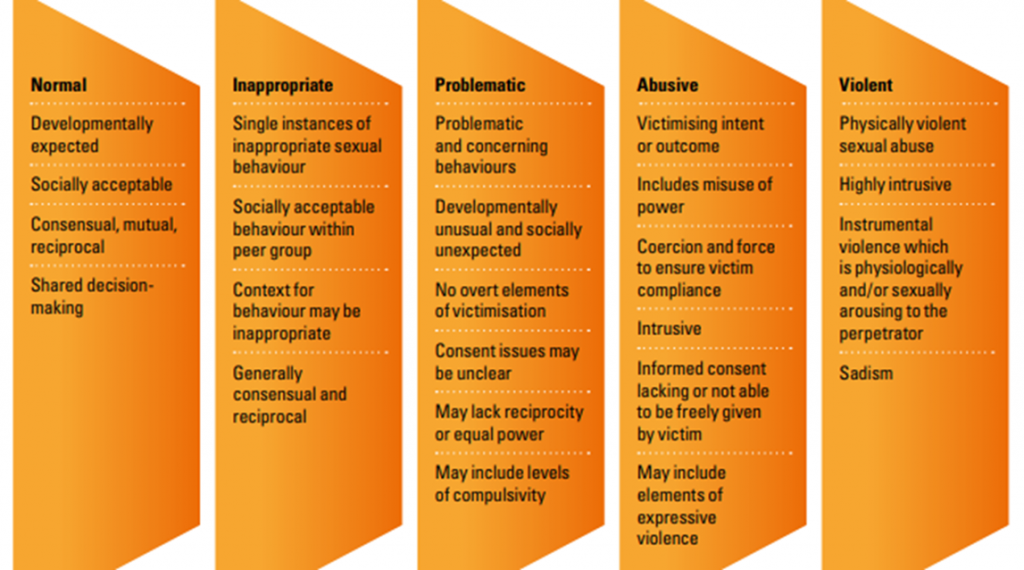Child Sexual Abuse
Please find guidance from the CSA Centre and the Lucy Faithfull Foundation regarding Safeguarding in the Whole Family when there are concerns for sexual offending in the family network:
https://www.csacentre.org.uk/documents/managing-risk-and-trauma-after-online-sexual-offending/
As a Partnership, one of our current priorities is developing our multi-agency practice in relation to Child Sexual Abuse (CSA).
CSA in the family and friendship environment is a really hard form of abuse for us to face, as it means thinking the unthinkable.
What is child sexual abuse?
- Involves forcing or enticing a child or young person to take part in sexual activities, not necessarily involving a high level of violence, whether or not the child is aware of what is happening.
- The activities may involve physical contact, including assault by penetration (for example, rape or oral sex) or non-penetrative acts such as masturbation, kissing, rubbing and touching outside of clothing. They may also include non-contact activities, such as involving children in looking at, or in the production of, sexual images, watching sexual activities, encouraging children to behave in sexually inappropriate ways, or grooming a child in preparation for abuse (including via the internet).
- Sexual abuse is not solely perpetrated by adult males. Women can also commit acts of sexual abuse, as can other children.
(HM Government, 2015)
Gain advice after you receive a disclosure or if you have concerns from observed behaviour or other indicators, before you speak with family members, or people may be placed at risk.
If several children or adults are involved, follow advice about organised or complex abuse investigations here.
This is the CSA Pathway:
https://csapathway.uk/index.html
Remember to share information, invite all involved professionals to a Sect 47 strategy meeting; map all those having contact with children or vulnerable adults; collate all allegations and disclosures.
If there is a referral where there is a query about child sexual abuse a paediatrician must always be part of the strategy meeting. A paediatrician can always be reached using the CSA paediatrician rota. Decisions to carry out or NOT to carry out a CSA medical MUST involve a paediatrician.
Our local learning has shown us that we need to be aware of signs and indicators of CSA as children often will not verbally disclose abuse.
Use this assessment tool:
Signs and Indicators of Child Sexual Abuse
https://www.csacentre.org.uk/knowledge-in-practice/practice-improvement/signs-indicators-template/
Children with additional vulnerabilities may be more likely to experience CSA – but not always.
Sometimes there is a power imbalance. Peers and siblings abuse each other- this is most prevalent form of CSA.
Look out for Disabled Children- they are more vulnerable to every form of abuse but can be helped to disclose! Find out more here.
Learning Disability information here.
CSA can be inter-generational, running through a family – remember to get a full history and genogram, including visitors to the home.
The NSPCC has produced a guide about working with children who display sexualised behaviour, which may be harmful:
https://learning.nspcc.org.uk/research-resources/learning-from-case-reviews/harmful-sexual-behaviour/
Safe parents, carers & other family members are the best people to help their children protect themselves from CSA.
Support for non-abusing parents here:
https://www.parentsprotect.co.uk/
Many survivors will only disclose abuse in adulthood – find out more here:
Online abuse is prevalent.
Child Pornography is not a term we use – it’s Child Sexual Abuse and it’s a crime too. Pornography is a term used for adults engaging in consensual sexual acts. When children are involved, it is not pornography. Using the incorrect terminology can trivialize the sexual abuse and exploitation of children.
Visit https://www.thinkuknow.co.uk/ for more information about online sexual abuse.
Perpetrators of Child Sexual Abuse are not easy to spot!
They take advantage of any opportunity & they can take a lot of time to groom a child or family.
5-10% of all CSA is carried out by women. Find out more here.
And here’s some support for those who struggle with abusing impulses:
Harmful Sexual Behaviour (HSB) is a prevalent form of CSA and sexual abuse between children as peers can be common and can lead to significant harm.
HSB can arise on the spectrum of the normal child developmental process. You can find out more here.
We want to use the Hackett Continuum, as a uniform way in Havering to identify levels of concern.

Barnardo’s TIGER HSB consultations leaflet_ (002)
Harmful Sexual Behaviours Training Leaflet
Tigerlight by Barnardo’s provides our local support. Find out more here:
Consultations
If you have concerns around a child/young person’s Harmful Sexual Behaviour, you can book consultations directly via ellen.roskilly@barnardos.org.uk
Training
The session covers:
- Ability to recognise some pathways to HSB
- Understanding of the correct terminology and language to use
- Confidence in engaging positively with children, young people with sexually harmful behaviour and their families
- Knowledge of the Signs and Symptoms of HSB
- Understanding of the impact of trauma and the links between Trauma & HSB
- Understanding of the role of parenting and how to talk to parents about HSB
- Understanding of how to respond to sibling’s victims of HSB
